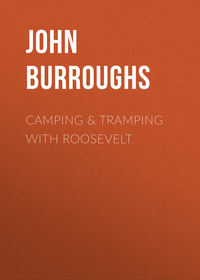 полная версия
полная версияWays of Nature
Organic life in all its forms is flexible; instinct is flexible; the habits of all the animals change more or less with changed conditions, but the range of the fluctuations in the lives of the wild creatures is very limited, and is always determined by surrounding circumstances, and not by individual volition, as it so often is in the case of man. In a treeless country birds that sing on the perch elsewhere will sing on the wing. The black bear in the Southern States "holes up" for a much shorter period than in Canada or the Rockies. Why is the spruce grouse so stupid compared with most other species? Why is the Canada jay so tame and familiar about your camp in the northern woods or in the Rockies, and the other jays so wary? Such variations, of course, have their natural explanation, whatever it may be. In New Zealand there is a parrot, the kea, that once lived upon honey and fruit, but that now lives upon the sheep, tearing its way down to the kidney fat.
This is a wide departure in instinct, but it is not to be read as a development of reason in its place. It is a modified instinct, – the instinct for food seeking new sources of supply. Exactly how it came about would be interesting to know. Our oriole is an insectivorous bird, but in some localities it is very destructive in the August vineyards. It does not become a fruit-eater like the robin, but a juice-sucker; it punctures the grapes for their unfermented wine. Here, again, we have a case of modified and adaptive instinct. All animals are more or less adaptive, and avail themselves of new sources of food supply. When the southern savannas were planted with rice, the bobolinks soon found that this food suited them. A few years ago we had a great visitation in the Hudson River Valley of crossbills from the north. They lingered till the fruit of the peach orchards had set, when they discovered that here was a new source of food supply, and they became very destructive to the promised crop by deftly cutting out the embryo peaches. All such cases show how plastic and adaptive instinct is, at least in relation to food supplies. Let me again say that instinct is native, untaught intelligence, directed outward, but never inward as in man.
VII. THE ROBINProbably, with us, no other bird is so closely associated with country life as the robin; most of the time pleasantly, but for a brief season, during cherry time, unpleasantly. His life touches or mingles with ours at many points – in the dooryard, in the garden, in the orchard, along the road, in the groves, in the woods. He is everywhere except in the depths of the primitive forests, and he is always very much at home. He does not hang timidly upon the skirts of our rural life, like, say, the thrasher or the chewink; he plunges in boldly and takes his chances, and his share, and often more than his share, of whatever is going. What vigor, what cheer, how persistent, how prolific, how adaptive; pugnacious, but cheery, pilfering, but companionable!
When one first sees his ruddy breast upon the lawn in spring, or his pert form outlined against a patch of lingering snow in the brown fields, or hears his simple carol from the top of a leafless tree at sundown, what a vernal thrill it gives one! What a train of pleasant associations is quickened into life!
What pictures he makes upon the lawn! What attitudes he strikes! See him seize a worm and yank it from its burrow!
I recently observed a robin boring for grubs in a country dooryard. It is a common enough sight to witness one seize an angle-worm and drag it from its burrow in the turf, but I am not sure that I ever before saw one drill for grubs and bring the big white morsel to the surface. The robin I am speaking of had a nest of young in a maple near by, and she worked the neighborhood very industriously for food. She would run along over the short grass after the manner of robins, stopping every few feet, her form stiff and erect. Now and then she would suddenly bend her head toward the ground and bring eye or ear for a moment to bear intently upon it. Then she would spring to boring the turf vigorously with her bill, changing her attitude at each stroke, alert and watchful, throwing up the grass roots and little jets of soil, stabbing deeper and deeper, growing every moment more and more excited, till finally a fat grub was seized and brought forth. Time after time, during several days, I saw her mine for grubs in this way and drag them forth. How did she know where to drill? The insect was in every case an inch below the surface. Did she hear it gnawing the roots of the grasses, or did she see a movement in the turf beneath which the grub was at work? I know not. I only know that she struck her game unerringly each time. Only twice did I see her make a few thrusts and then desist, as if she had been for the moment deceived.
How pugnacious the robin is! With what spunk and spirit he defends himself against his enemies! Every spring I see the robins mobbing the blue jays that go sneaking through the trees looking for eggs. The crow blackbirds nest in my evergreens, and there is perpetual war between them and the robins. The blackbirds devour the robins' eggs, and the robins never cease to utter their protest, often backing it up with blows. I saw two robins attack a young blackbird in the air, and they tweaked out his feathers at a lively rate.
One spring a pack of robins killed a cuckoo near me that they found robbing a nest. I did not witness the killing, but I have cross-questioned a number of people who did see it, and I am convinced of the fact. They set upon him when he was on the robin's nest, and left him so bruised and helpless beneath it that he soon died. It was the first intimation I had ever had that the cuckoo devoured the eggs of other birds.
Two other well-authenticated cases have come to my knowledge of robins killing cuckoos (the black-billed) in May. The robin knows its enemies, and it is quite certain, I think, that the cuckoo is one of them.
What a hustler the robin is! No wonder he gets on in the world. He is early, he is handy, he is adaptive, he is tenacious. Before the leaves are out in April the female begins her nest, concealing it as much as she can in a tree-crotch, or placing it under a shed or porch, or even under an overhanging bank upon the ground. One spring a robin built her nest upon the ladder that was hung up beneath the eaves of the wagon-shed. Having occasion to use the ladder, we placed the nest on a box that stood beneath it. The robin was disturbed at first, but soon went on with her incubating in the new and more exposed position. The same spring one built her nest upon a beam in a half-finished fruit house, going out and in through the unshingled roof. One day, just as the eggs were hatched, we completed the roof, and kept up a hammering about the place till near night; the mother robin scolded a good deal, but she did not desert her young, and soon found her way in and out the door.
If a robin makes up her mind to build upon your porch, and you make up your mind that you do not want her there, there is likely to be considerable trouble on both sides before the matter is settled. The robin gets the start of you in the morning, and has her heap of dry grass and straws in place before the jealous broom is stirring, and she persists after you have cleaned out her rubbish half a dozen times. Before you have discouraged her, you may have to shunt her off of every plate or other "coign of vantage" with boards or shingles. A strenuous bird indeed, and a hustler.
VIII. THE CROWOne very cold winter's morning, after a fall of nearly two feet of snow, as I came out of my door three crows were perched in an apple tree but a few rods away. One of them uttered a peculiar caw as they saw me, but they did not fly away. It was not the usual high-keyed note of alarm. It may have meant "Look out!" yet it seemed to me like the asking of alms: "Here we are, three hungry neighbors of yours; give us food." So I brought out the entrails and legs of a chicken, and placed them upon the snow. The crows very soon discovered what I had done, and with the usual suspicious movement of the closed wings which has the effect of emphasizing the birds' alertness, approached and devoured the food or carried it away. But there, was not the least strife or dispute among them over the food. Indeed, each seemed ready to give precedence to the others. In fact, the crow is a courtly, fine-mannered bird. Birds of prey will rend one another over their food; even buzzards will make some show of mauling one another with their wings; but I have yet to see anything of the kind with that gentle freebooter, the crow. Yet suspicion is his dominant trait. Anything that looks like design puts him on his guard. The simplest device in a cornfield usually suffices to keep him away. He suspects a trap. His wit is not deep, but it is quick, and ever on the alert.
One of our natural history romancers makes the crows flock in June. But the truth is, they do not flock till September. Through the summer the different families keep pretty well together. You may see the old ones with their young foraging about the fields, the young often being fed by their parents.
From my boyhood I have seen the yearly meeting of the crows in September or October, on a high grassy hill or a wooded ridge. Apparently, all the crows from a large area assemble at these times; you may see them coming, singly or in loose bands, from all directions to the rendezvous, till there are hundreds of them together. They make black an acre or two of ground. At intervals they all rise in the air, and wheel about, all cawing at once. Then to the ground again, or to the tree-tops, as the case may be; then, rising again, they send forth the voice of the multitude. What does it all mean? I notice that this rally is always preliminary to their going into winter quarters. It would be interesting to know just the nature of the communication that takes place between them. Not long afterwards, or early in October, they may be seen morning and evening going to and from their rookeries. The matter seems to be settled in these September gatherings of the clan. Was the spot agreed upon beforehand and notice served upon all the members of the tribe? Our "school-of-the-woods" professors would probably infer something of the kind. I suspect it is all brought about as naturally as any other aggregation of animals. A few crows meet on the hill; they attract others and still others. The rising of a body of them in the air, the circling and cawing, may be an instinctive act to advertise the meeting to all the crows within sight or hearing. At any rate, it has this effect, and they come hurrying from all points.
What their various calls mean, who shall tell? That lusty caw-aw, caw-aw that one hears in spring and summer, like the voice of authority or command, what does it mean? I never could find out. It is doubtless from the male. A crow will utter it while sitting alone on the fence in the pasture, as well as when flying through the air. The crow's cry of alarm is easily distinguished; all the other birds and wild creatures know it, and the hunter who is stalking his game is apt to swear when he hears it. I have heard two crows in the spring, seated on a limb close together, give utterance to many curious, guttural, gurgling, ventriloquial sounds. What were they saying? It was probably some form of the language of love.
I venture to say that no one has ever yet heard the crow utter a complaining or a disconsolate note. He is always cheery, he is always self-possessed, he is a great success. Nothing in Bermuda made me feel so much at home as a flock of half a dozen of our crows which I saw and heard there. At one time they were very numerous on the island, but they have been persecuted till only a remnant of the tribe remains.
IMy friend and neighbor through the year,Self-appointed overseerOf my crops of fruit and grain,Of my woods and furrowed plain,Claim thy tithings right and left,I shall never call it theft.Nature wisely made the law,And I fail to find a flawIn thy title to the earth,And all it holds of any worth.I like thy self-complacent air,I like thy ways so free from care,Thy landlord stroll about my fields,Quickly noting what each yields;Thy courtly mien and bearing bold,As if thy claim were bought with gold;Thy floating shape against the sky,When days are calm and clouds sail high;Thy thrifty flight ere rise of sun,Thy homing clans when day is done.Hues protective are not thine,So sleek thy coat each quill doth shine.Diamond black to end of toe,Thy counter-point the crystal snow.IINever plaintive nor appealing,Quite at home when thou art stealing,Always groomed to tip of feather,Calm and trim in every weather,Morn till night my woods policing,Every sound thy watch increasing.Hawk and owl in tree-top hidingFeel the shame of thy deriding.Naught escapes thy observation,None but dread thy accusation.Hunters, prowlers, woodland loversVainly seek the leafy covers.IIINever plaintive nor appealing,Quite at home when thou art stealing,Noisy, scheming, and predacious,With demeanor almost gracious,Dowered with leisure, void of hurry,Void of fuss and void of worry,Friendly bandit, Robin Hood,Judge and jury of the wood,Or Captain Kidd of sable quill,Hiding treasures in the hill,Nature made thee for each season,Gave thee wit for ample reason,Good crow wit that's always burnishedLike the coat her care has furnished.May thy numbers ne'er diminish,I'll befriend thee till life's finish.May I never cease to meet thee,May I never have to eat thee.And mayest thou never have to fare soThat thou playest the part of scarecrow.1
See comment on the story here alluded to on page 244.
2
Except in the case of certain birds of India and Australia.
3
Except in the case of certain birds of India and Australia.
4
A book published in London in 1783, entitled A Geographical, Historical, and Commercial Grammar and the Present State of the Several Kingdoms of the World, among other astonishing natural history notes, makes this statement about the white and red fox of Norway: "They have a particular way of drawing crabs ashore by dipping their tails in the water, which the crab lays hold of."
5
Atlantic Monthly, March, 1903.
6
I have tried the experiment on two ordinary clams, and they both died on the third day.









